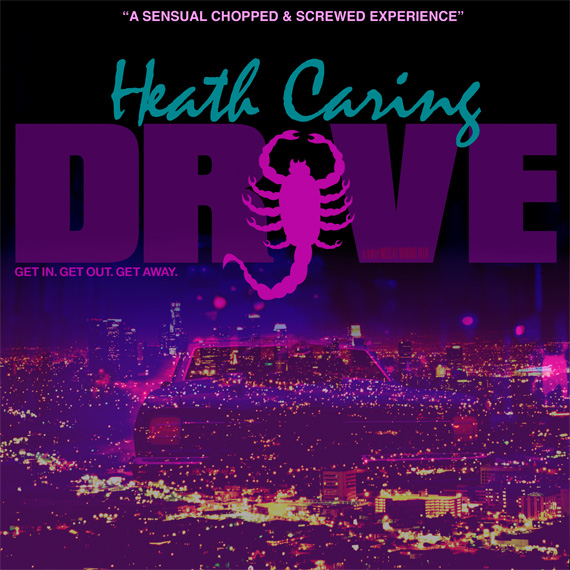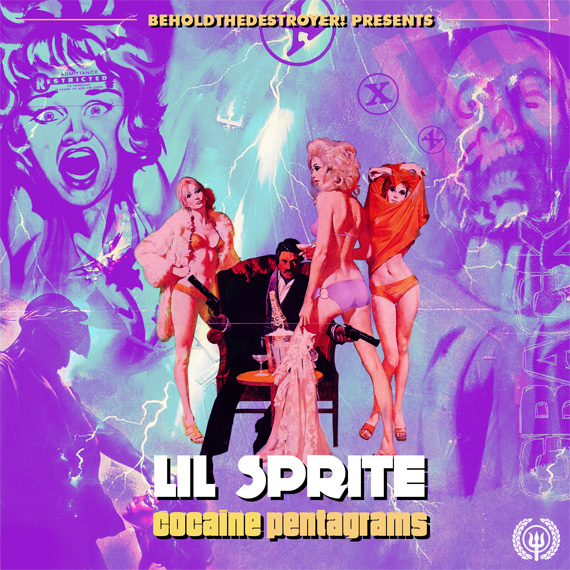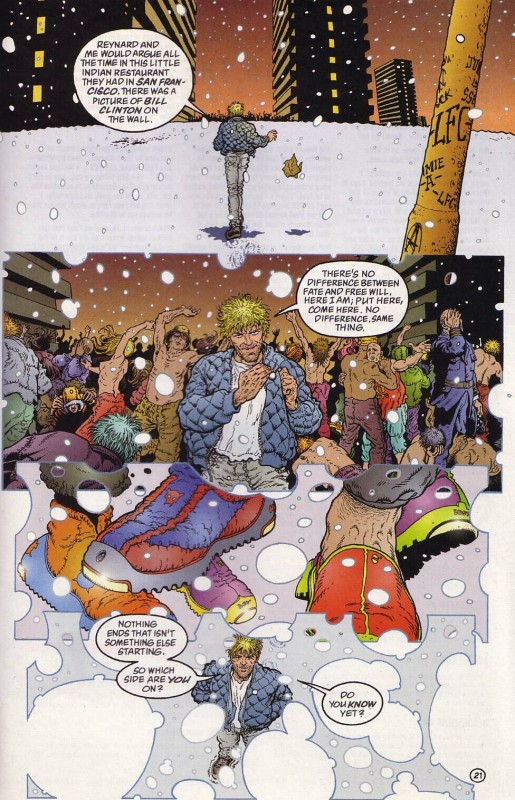
“Paradise not lost, it’s in you” [On urban ennui]
July 18th, 2012 Posted by david brothersThe Damon Albarn Appreciation Society is a series of twenty focused observations, conversations, and thoughts about music. This is the final entry. I had a conversation with a friend about Damon Albarn and what I’ve been calling urban ennui. This is me trying to quantify that feeling, and how the music I enjoy the most has reflected or dealt with that feeling. This is more a collection of thoughts than a proper essay, but I hope you underdig it regardless.
Minutes from previous meetings of the Society: The Beatles – “Eleanor Rigby”, Tupac – Makaveli, Blur – 13 (with Graeme McMillan), Blur – Think Tank (with Graeme McMillan), Black Thought x Rakim: “Hip-Hop, you the love of my life”, Wu-Tang Clan – Enter The Wu-Tang (36 Chambers), On why I buy vinyl sometimes, on songs about places, Mellowhype’s Blackendwhite, a general post on punk, a snapshot of what I’m listening to, on Black Thought blacking out on “75 Bars”, how I got into The Roots, on Betty Wright and strong songs, on screw music, on Goodie MOb’s “The Experience”, on blvck gxds and recurring ideas, on Killer Mike and political rap, on Ghostface Killah and storytelling
-One of my favorite, or maybe my most favorite, songs on the debut album from the Gorillaz is “M1A1.” Listen:
-The first couple minutes of this song are taken almost verbatim from George Romero’s Day of the Dead. The man’s shouts for other people turn the song into something a little creepy. He’s seeking companionship and finding none, but he keeps trying and the music eventually buries him. The implication is that he never finds anyone.
-“M1A1” could mean a lot of things. It’s a type of tank, a flamethrower, and a submachine gun. It’s also the name for a road in England, built toward the end of the ’90s. From wikipedia:
Between 1996 and 1999 the M1 section north of the M62 underwent a major reconstruction and extension to take the M1 on a new route to the A1(M) at Aberford. The new road involved the construction of a series of new junctions, bridges and viaducts to the east of Leeds. When the new section of M1 was completed and opened on 4 February 1999, the Leeds South Eastern Motorway section of the M1 was redesignated as the M621 and the junctions were given new numbers (M621 junctions 4 to 7).
-The song goes from empty loneliness to rapid-fire music and shouts. It’s an interesting balance. It’s not even remotely single-worthy or radio-ready, but it’s still a great song.
-It evokes a specific mood. It sounds like cities feel. You don’t talk to strangers. You don’t make friends. You stay in your bubble until you reach safety, and then you get to go wild — party, drugs, girls, sports, whatever.
-That mood puts me in mind of a Kid Cudi line from one of my favorite songs about depression: “Crush a bit, little bit, roll it up, take a hit. Feeling lit, feeling light, 2 a.m., summer night.” This is how we have fun. Looking out over a city when it’s long past bedtime, enjoying the quiet, the swoosh of cars going by outside or at street level, and the cool winds. But it’s a little futile, too. The song’s called “Pursuit of Happiness.”
I bailed out of my life and went to Los Angeles last week for a few days. No email, no tweets, no nada. I don’t think I even texted that much, beyond getting directions from the LA gang. I spent Saturday night in Santa Monica, and I woke up around 3am. I got something to drink, looked out of a window, and realized that it was bright outside. The city lights made 3am look like 7pm. The weather made it feel the same. An eternal comfortable twilight, the perfect time of day locked in place and preserved. I wanted to take a walk, but instead I just went back to bed.
-I live in San Francisco, and sometimes I take walks at night with my iPod. This city is really nice at night, and I live in a pretty busy part of town. It isn’t quite as bright as Santa Monica was after midnight, but it’s still nice. My only issue is with the weather — I have to bring a jacket when I go out. But, sometimes, you hit that perfect balance and the city is beautiful in all the right ways.
-A couple Sundays ago, I found myself sitting on a bench in Japantown (a district in SF, just a couple blocks from my place), pleasantly faded, reading stories out of a copy of William Gibson’s Burning Chrome that the homey Sean Witzke sent me. It sounds simple, I mean I was just reading outside on a bench, but that’s not an experience I could have back home in Georgia. The people going by, the location, the smell of food from Yakini-Q drifting down the block, the reflections from the New People building… there’s something special there. Something fascinating and appealing.
-One of my favorite images of a city is a Black Star song, “Respiration.” It opens with a woman saying “Escuchela… la ciudad respirando.” I don’t know where that’s from, but here’s the hook and a youtube:
So much on my mind that I can’t recline
Blastin holes in the night til she bled sunshine
Breathe in, inhale vapors from bright stars that shine
Breathe out, weed smoke retrace the skyline
Heard the bass ride out like an ancient mating call
I can’t take it y’all, I can feel the city breathin
Chest heavin, against the flesh of the evening
Sigh before we die like the last train leaving
It’s beautiful, yeah? I love “Breathe in: inhale vapors from bright stars that shine/ Breathe out: weed smoke retrace the skyline.” It’s crystal clear, a thousand words worth of imagery packed into two short lines. When I think of what I like about cities, this is what I think of. The city as a living, breathing organism and the citizens as people just trying to get by.
-I loved this song before I moved to a real city. I spent a couple years in Madrid, but that wasn’t quite the same. I wasn’t on my own. When I moved to SF and found myself alone, I finally understood the melancholy aspects of the song. City living is like nothing else, but it will burn you out if you can’t keep up.
–“I don’t know why I chose to smoke sess. I guess that’s the time that I’m not depressed.”
-I was trying to explain this to a friend in email, and the only compact term I could come up with for what I’m talking about was “urban ennui.” Urban ennui is that feeling that arises when you’re caught between a city’s majesty and its dungeon. It’s the combination of pretending you’re sober enough to talk to a pretty girl on somebody’s balcony at midnight and curling into a fetal ball in your apartment because the pressure is too much a week later, and then doing it all again because escape is unthinkable and unwanted.
-The feeling isn’t ennui, not really. Ennui is a listlessness, a tiredness. It’s exhaustion. Depression. But that’s the closest feeling I could come up with, even though this is something different.
Urban ennui about the push and the pull between the sacred and the profane, and how both are required if you’re living in the city. It’s how a smile from a stranger can change your day just as fast as a mean mug from another. It’s how a snarl of cars is beautiful from four stories up and a nightmare at street level.
-I can hear traffic from my place late at night, when it’s real quiet. I like how cities sound, and if I’m up late, not sleeping, that quiet motion is comforting, like the ocean. I don’t know why I like it, I doubt if I could quantify it, but I do.
-One of my favorite rappers, a guy whose career has had almost undue influence on my writing style, is El-P. He started with Company Flow, moved to Definitive Jux, and I’ve followed him ever since I first heard CoFlow’s Funcrusher Plus. Here’s his song “For My Upstairs Neighbors (Mums The Word)” off his (very good) Cancer 4 Cure album.
He packs a lot in. Cops as hostile invaders and obstacles, New York attitude, snitching, abuse, but most of all, the unique relationship between neighbors in a city. You hear the noises from other apartments, the arguments and screams and orgasms and heels, and you ignore it. There’s no real common area, so you don’t hang out and become friends. Each apartment is a world unto itself, orbiting the sun of the apartment building but existing almost entirely apart from it, as well.
-I don’t know any of my neighbors. I’ve had conversations and introduced myself to a few, but I wouldn’t call any of them friends. We don’t hang out. We smile as we pass each other and continue on in our lives.
I live directly across from the main elevator and stairs, so I hear everyone. Snatches of conversation. Muttered arguments. Drunken ramblings. But I don’t know anyone. I don’t know faces, only voices, and I barely know those. I have neighbors, but they just live near me. They aren’t neighbors like I had back home.
-El-P is familiar with urban ennui. It bleeds out of his discography, in addition to his songs about abuse, addiction, and depression. It’s one of the things I like most about his work, honestly. That paranoia and pain that oozes out of songs like “Stepfather Factory” and “The Jig Is Up” hit me hard.
-It’s no surprise that whatever it is inside me that loves cities latched onto El-P and his love of the same. The actual surprise, though, was Damon Albarn.
-Blur just released two new songs: “Under the Westway” and “The Puritan.” They’re pretty good.
-The Westway is another road. Albarn sang about it in “For Tomorrow,” from Modern Life Is Rubbish. A video and another quote:
She’s a twentieth century girl,
With her hands on the wheel.
Trying not to be sick again,
Seeing what she can borrow.
London’s so nice back in your seamless rhymes
But we’re lost on the Westway.
So we hold each other tightly,
And we can wait until tomorrow.
“We’re lost on the Westway, so we hold each other tightly, and we can wait until tomorrow.” Terror and love, inseparable.
-I like “Under The Westway” more than I like “The Puritan,” but that’s more due to the fact that “Westway” sounds more like the era of Blur I’m really into, their 13 and Think Tank
albums. “The Puritan” sounds more like Modern Life Is Rubbish
to me. (Not a complaint, mind.)
“Westway” is properly melancholy and explicitly about cities. Here’s an excerpt:
There were blue skies in my city today
Ev’rything was sinking
Said snow would come on Sunday
The old school was due and the traffic grew
Up on the WestwayWhere I stood watching comets on their lonesome trails
Shining up above me the jet fuel it fell
Down to earth where the money always comes first
And the sirens singBring us the day they switch off the machines
Cos men in yellow jackets, putting adverts inside my dreams
An automated song and the whole world gone
Fallen under the spell of theDistance between us when we communicate
Still picking up shortwave
Somewhere they’re out in space
It depends how you’re wired when the night’s on fire
Under the Westway
Love-horror-love-horror-love-cities. Again and again.
-I got into Gorillaz (who I’d liked since high school) in a major way after I moved to SF. I reconsidered Demon Days, I dug Plastic Beach
, and I grabbed all the b-sides I could find. Here’s a snap from my Google Music:

I don’t have everything (I haven’t grabbed the Laika album yet), but I do have most of their stuff.
-I also got into Blur, and Albarn in general. I’ve enjoyed all of his side projects to varying degrees. I haven’t disliked any of them. Some are just more good than others.
The internet makes it easy to binge on an artist’s discography (“damon albarn discography mp3 high quality”), but I don’t usually get into artists like I get into Albarn. I never felt like I needed to get every Joe Budden song ever, or Fabolous. But I did that with Albarn, and I’ve even got three zips of bootlegs and live recordings to go through even still.
-I think I binged so hard because Albarn scratched the same itch that El-P does. They’re both exploring these ideas of love, hunger, fear, and obsession on wax. They have a habit of seeing the beauty in pain — El-P enabling a neighbor to murder her abusive husband, Albarn focusing on the love that keeps us together in hard times — and being honest about who we are and where we live.
They don’t have a lot of common ground, but the common ground they do have is remarkable. I don’t think they’ve come to the same conclusions, either. Albarn seems like he’s made his peace with how things are, while El is much more abrasive and prickly about it. Maybe that’s that New York swagger vs whatever they have in London, I don’t know, but I enjoy thinking about it.
-I wouldn’t be the person or writer I am today without music. Specifically rap music, guys like Nas and El-P and Aesop Rock and Cannibal Ox and Jay-Z and OutKast and Goodie MOb and Backbone and Cool Breeze and Too $hort and Mos Def and Talib Kweli and RA the Rugged Man and dozens more. They all either explored ideas that are near and dear to my heart or explored ideas in a particularly clever way.
The language they used and the ideas they explored are what made the difference. They opened something up to me, whether it was showing that every subject is worthy of consideration or just flipping a hysterical lyrical miracle off a spherical aerial toward the pinnacle, minimal satirical.
The way that I talk, the way I choose to write, is a direct product of a childhood spent listening to music. The books that I read ranged from classics to airport trash, and none of them hit me as hard as, say, “It Ain’t Hard To Tell” or “Find A Way” or “2nd Round KO” or “Uni-4-Orm” or “Fugee-La” or “Scream Phoenix” or “Shadowboxin’/4th Chamber.”
-Music taught me to be willing to find different ways to explore ideas, rather than just being simple and straightforward and boring. If you have to work for something, even just a little, it tastes better.
-I realized that several of my most favorite songs and albums explore city life and urban ennui entirely by accident, but it made a lot of things about me fall into place. It’s like opening a safe. The tumblers fall, click click click click, and then the door slides open and you have that lightbulb moment.
It makes sense. City living is stressful, especially on your own, and why wouldn’t it be explored via music? San Francisco, London, Los Angeles, New York, whatever. There are differences, but I bet the basic foundation of living in those cities is the same. It’s one of those things you have to make your peace with, or else just leave the city entirely.
-I’ve started running in the mornings, since I’m not really biking currently. I know my neighborhood well, or at least maybe a three square block radius. It’s different when you’re up at 6 or 7 and winding your way through the sidewalks, portapotties, and overgrown trees. You look at different things because you can’t run with your head down. It’s easy to find something you never noticed before as you watch the fog burn off.
It’s another angle on the city, basically, something new to love and fear.
-Urban ennui isn’t a concrete concept, or like a dominant one or something like that. It’s part of a spectrum of things: depression, relationships, adulthood, son-hood, and whatever else. But this feels significant to me, it’s something that matters. It’s something that’s real.
-Thanks for reading.




